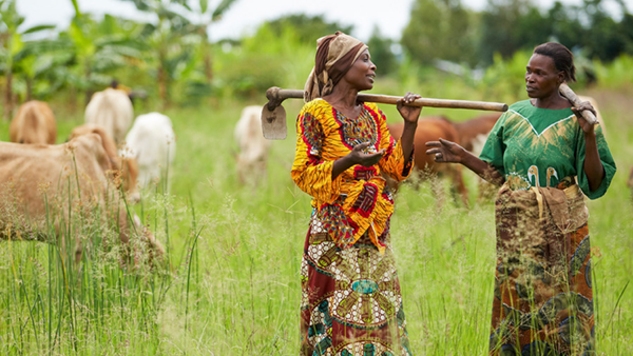
“Modernising agriculture and making the structural shifts from farming to efficient manufacturing and modern services is just the start.”
BILL and Melinda Gates, in their 2015 annual letter, write about remarkable breakthroughs possible over the next 15 years—in health, in education, in technology, in agriculture.
They see how improving agriculture, the backbone of the African economy, can drive massive poverty reduction and improve life across the continent.
We agree. The Millennium Development Goals for 2015 have succeeded remarkably in focusing the world on poverty and on government policies to reduce it rather than wait for growth to trickle down.
For Africans, the core of the development agenda after 2015, to be decided at this year’s UN General Assembly, must be to create jobs, increase the productivity of all workers, and end extreme poverty in its many forms.
To do this will take more than targeted government social policies, though such policies can do much for the health, education, and sanitation of those most vulnerable. It will require more than economies that simply grow thanks to macroeconomic reforms and commodity booms. Indeed, it will require economies that grow and transform.
Transformation is the new buzzword in development circles, but it means different things to different people. For us at the African Center for Economic Transformation, it is growth through modernising agriculture and making the structural shifts from farming to efficient manufacturing and modern services.
It is growth through expanding the technical capabilities of people and institutions. It is growth through upgrading the technologies that people use on farms, in firms, and in government offices. It is growth through becoming internationally competitive and active players in global chains.
Structural change
All these channels are mutually reinforcing. Thus it is that a transforming economy—more than just a growing economy—can create good jobs and share the fruits of prosperity. And thus it is that a Ghana can become a Korea, a Rwanda can become a Singapore, and a Nigeria can become a Brazil.
But economic transformation is just a means. The end must be to create productive jobs for all Africans. With good policies for the poor and vulnerable, those jobs can end extreme poverty on the continent, something unimaginable a decade ago, but now within reach.
And those jobs can narrow considerably the inevitable income gaps that exist between rich and poor in rapidly developing economies. How, then, to transform?
We agree with the Gates letter: Start on farms. Agriculture makes up the bulk of most African economies, and most of the extreme poor rely on subsistence farming for their livelihoods. That is why Africa’s economic transformation has to start on farms, by modernising agriculture.
Yes, a shift to light manufacturing can help, as can developing the many service businesses. But urban growth cannot, by itself, transform rural Africa. Rural transformation has to begin with increasing the productivity of smallholders to boost their incomes.
Raise demand
Second is modernising agriculture by supporting small-scale commercial farmers, whose operations will also help smallholders and those setting up small off-farm enterprises.
Third is using agriculture as the basis for manufacturing and services, particularly by increasing agro-processing. That will produce jobs to help address the growing youth unemployment. It will also increase the demand (and prices) for what smallholders produce.
Fourth is moving up the value chain for agricultural exports. That will increase the incomes of everyone along the value chain. It will also produce foreign exchange to pay for the imports that can spur further growth and transformation.
What will all this take? A lot, to be sure. But the main requirement is for governments to work closely with the private sector—to build the right roads and power stations in the right places, to open businesses to competition (especially transport), to focus on smart and streamlined regulation.
Just look at horticulture in Kenya and leather products in Ethiopia. African governments are getting support in their efforts. The Alliance for a Green Revolution in Africa, launched in 2008, is an Africa-based organisation working with farmers, governments, agricultural research organisations, and other rural stakeholders to improve the productivity and incomes of resource-poor farmers in Africa.
Promising
And the G-8, at its May 2013 meeting, agreed to support the New Alliance for Food Security and Nutrition, with the goal of ending hunger and poverty for 50 million Africans in the next decade.
More than 60 African and global companies have since committed to investing $3.5 billion in seeds, fertilisers, and small-scale irrigation. The prospects for Africa’s economic transformation are thus promising.
Many African economies are growing faster than they have in 40 years. And that growth is providing the resources to expand technical capabilities, upgrade technologies, and become internationally competitive.
In sum, Africa may be rising, as the Gates letter notes, but to continue rising, Africa has to transform its economies to create productive jobs and end extreme poverty. And to do this, it needs to start with agriculture. Shouldn’t that be a core goal for the world development community to pursue after 2015?
If met, that would do much to meet other goals for extending education, for reducing child and maternal deaths, for improving the lives of all Africans.
Author: K.Y. Amoako is founding president of the African Center for Economic Transformation, with headquarters in Accra.







